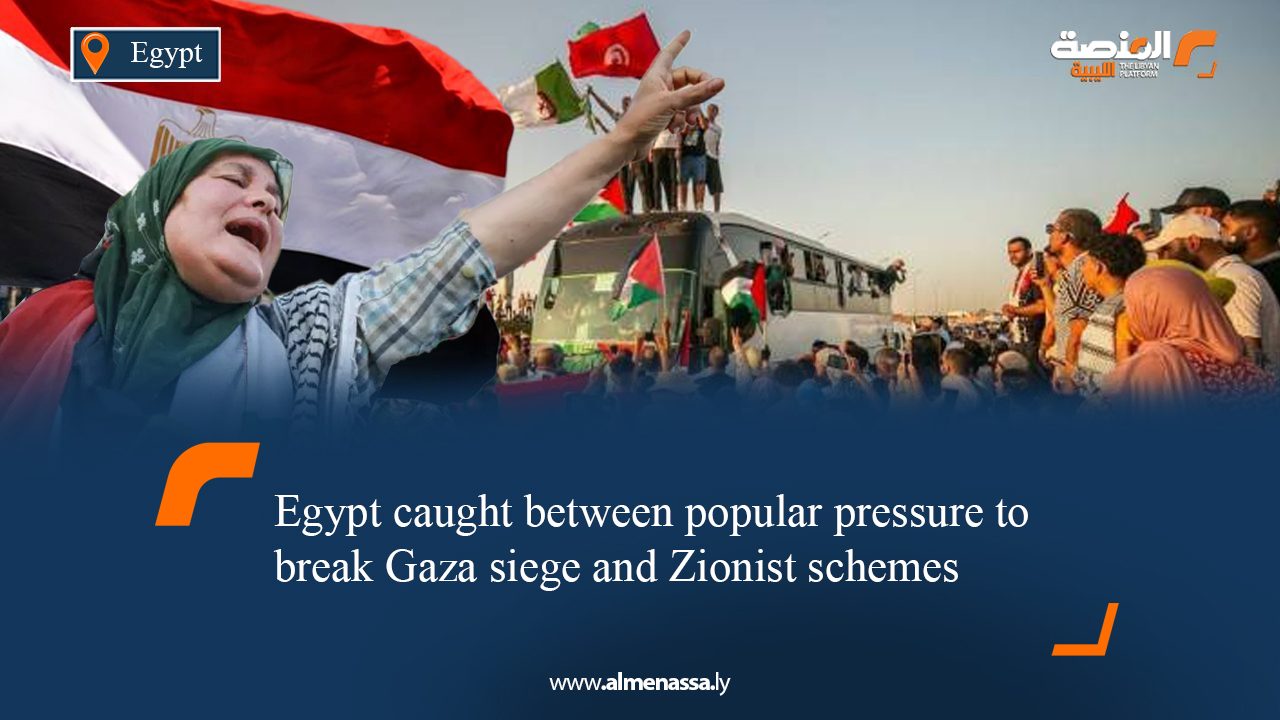A Maghreban solidarity convoy, aiming to break the siege on the Gaza Strip, continues its journey, traversing several cities. Having entered Libya after passing through Tunisia, the convoy is now heading to Egypt.
Organisers announced on their social media pages that the overland convoy is expected to reach Cairo on Thursday, before heading to the Rafah crossing, where it is anticipated to arrive on Sunday.
Amidst this sustained popular North African determination and ongoing momentum for the convoy, Cairo may face an awkward predicament regarding its passage. Egypt’s official stance has been one of silence, sidestepping a decisive position on allowing or denying entry, as it confronts numerous challenges.
Foremost among these challenges is the entry of foreign individuals requiring pre-arranged visas, alongside a significant number of people wishing to enter the Strip whose affiliations and orientations remain unknown. This complicates the security situation. Furthermore, permitting such a large contingent to traverse over 700km from its western extremity to its eastern border poses immense challenges for security agencies.
It is also pertinent that allowing the convoy could place Egypt in an embarrassing position with Israel, particularly if subjected to pressure to prevent its entry.
Consequently, several informed Egyptian sources have indicated that the convoy is unlikely to be permitted entry. Organisers are reportedly aware that the crossings into Gaza are closed and Israel will not allow them through, raising questions about the true purpose of the convoy. This might be elucidated by the Egyptian authorities’ decision to deport Moroccan activist Jamila Azzouzi from Cairo airport, as she was on her way to join the international convoy destined for Palestine in solidarity with the residents of the Gaza Strip.
Breaking the siege
Haithem Badr, a participant in the convoy, stated that “the objective is not to enter Gaza, and this is not an aid convoy; aid is already piled up in tremendous quantities before the Rafah crossing. The aim is to break the siege on aid entry through popular pressure at the crossing.”
He added that “before the convoy’s departure, Tunisian authorities and the Libyan and Egyptian embassies in Tunisia were notified. The response from both the Libyan and Tunisian sides was positive and encouraging, but the Egyptian embassy has not yet responded,” he claimed.
Conversely, Ghassan Hanchiri, spokesperson for the “Convoy of Steadfastness,” affirmed that “the convoy has not, as yet, received any official permits to enter Egyptian territory.”
From another perspective, Cairo’s refusal to allow the convoy’s entry could place authorities in a difficult position, one that some parties are reportedly planning to exploit. This would portray Egypt as having failed in its duty to assist the people of Gaza, who face death daily from starvation or bombardment.
Media controversy
In this vein, the convoy has sparked significant debate on social media platforms in Egypt. Egyptian media personality Ahmed Moussa viewed the convoy as “an attempt to outbid Egypt and its supportive stance on the Palestinian cause,” asserting “there are security risks in allowing the convoy into Egyptian territory… and those participating do not hold entry visas, knowing also that Israel will not permit their entry, the objective is media spectacle.”
Mustafa Bakry, a member of the Egyptian House of Representatives, concurred, emphasising that “the convoy’s aim is to embarrass Egypt,” stressing that “Cairo’s position in supporting the Palestinian cause and rejecting displacement is steadfast and does not require validation from anyone.”
Scheme to liquidate the Palestinian cause
Bakry highlighted President Sisi’s warning against a scheme aimed at liquidating the Palestinian cause by congregating Palestinians near the Egyptian-Palestinian border as a prelude to executing the plan, indicating Egypt’s full awareness of the unfolding situation.
He added that the scheme intends to embarrass Egypt, placing it before two options: either confronting any attempt at displacement with decisive force to protect national security and reject the liquidation of the cause – in which case some would propagate that Egypt is killing Palestinians, prompting conspiring forces to launch systematic campaigns against Egypt and demand its punishment; or allowing entry – in which case it would be claimed that Egypt accepted payment and participated in the liquidation of the Palestinian cause.
Bakry affirmed that Egypt faces a complex situation, and the conspiracy is vast. The sole option is to safeguard Egypt’s security, reject the liquidation of the Palestinian cause, and persist in demanding that the international community halt the war of annihilation and the starvation siege, and grant the Palestinian people their legitimate national rights.
Between popular pressure and the declared objective of the Convoy of Steadfastness, and amidst security challenges, Israeli pressures, and the Zionist scheme, the Egyptian position remains intricate, demanding astuteness, diplomacy, and profound awareness to navigate the situation and secure the rights of the people of Gaza.


